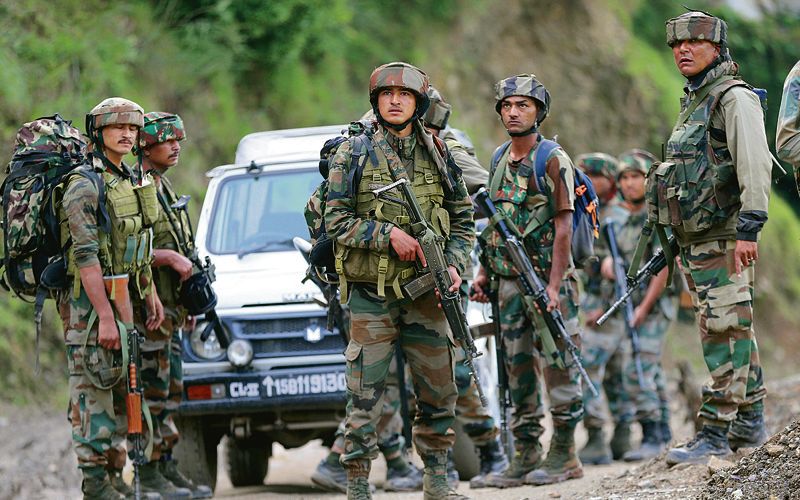India needs a strategic approach to hybrid warfare

IN the evolving landscape of modern warfare, India must adapt to the concept of hybrid warfare to strengthen its defence and deterrence strategies. Hybrid warfare, characterised by a blend of conventional weapons, irregular tactics, cyberattacks and other unconventional methods, requires a nuanced and resilient approach to effectively counter the multifaceted threats from its adversaries. According to NATO, hybrid threats combine military and non-military as well as covert and overt means, including disinformation, economic pressure, deployment of irregular armed groups and the use of regular forces. “Hybrid methods are used to blur the lines between war and peace, and attempt to sow doubt in the minds of target populations. They aim to destabilise and undermine societies… the speed, scale and intensity of hybrid threats have increased in recent years,” observes the US-led alliance.

The cornerstone of India’s strategy should be resilience. Leveraging its inherent strengths, India can put adversaries at a disadvantage and fortify its strategic stance against hybrid threats. Eschewing the traditionally rigid distinctions between conventional and irregular warfare, India’s approach should recognise the continuum of conflict, integrating various methods and modes of warfare.
India’s western border with Pakistan is a significant area of concern. Pakistan has been accused of engaging in hybrid warfare tactics, including sabotage, terrorism and cyberattacks, particularly in regions like Jammu and Kashmir and Punjab. Recent incidents underscore the gravity of the threat. In a deadly encounter in Doda, four Army soldiers, including a Captain, were killed earlier this week, bringing the total number of personnel killed in the region to 48 over the past 32 months. The joint operation by the Army and the Jammu and Kashmir Police highlights the persistent danger of cross-border terrorism. The Army has claimed that a number of measures have been instituted to enhance synergy between various agencies, such as joint training with the J&K Police and Central Armed Police Forces and “a robust intelligence-sharing mechanism between the Army, the police and other intelligence agencies”.
(Read More: Human Security Issues in Border Regions: Challenges and Solutions)
The rise of narco-terrorism and the use of drones for cross-border insurgency reflects the evolving nature of this hybrid conflict. Pakistan’s support for proxy forces, terrorist organisations and drug cartels poses a severe threat to India’s security. The blending of advanced military capabilities with irregular tactics has been a persistent issue, necessitating preparedness to deflect these ‘wars in the shadows’ while enhancing collective defence capabilities.
On the northern front, India’s relations with China present a different set of challenges. China’s strategy includes psychological, political and legal tactics — collectively known as the ‘three warfares’ — to achieve its geopolitical goals. The Chinese investment in the United Front Work Department to influence the Chinese diaspora and foreign communities, along with the use of front organisations, exemplifies its hybrid warfare strategy. Beijing’s increasing use of commercial security operations to protect its interests abroad, coupled with its blurred tactics and quasi-military forces in the maritime domain, underscores its innovative approach to hybrid conflicts. The likelihood of indirect and proxy Chinese intervention is a growing concern, particularly as China expands its influence across Asia and beyond.
(Read More: 1947 – 1948: First India-Pakistan War)
The insurgency landscape within India also demands attention. The spate of terror attacks in the Jammu region and the continued unrest in Manipur highlight the internal challenges. Additionally, the Naxal insurgency in central India remains a significant threat, with numerous attacks on security forces and civilians. In response to the rising terror incidents, Prime Minister Narendra Modi has reviewed the security situation, discussing counter-terrorism efforts with top officials. The situation in Punjab is also concerning, with increased activities of narco-terrorism and drone infiltrations from Pakistan necessitating a robust response.
To effectively counter these hybrid threats, India must integrate hybrid warfare into its defence strategies. This involves overcoming natural disadvantages and leveraging India’s strengths, interests and values. India’s strategic approach should emphasise resilience, with border guarding forces and Army personnel equipped to handle advanced technologies and hybrid threats. The ongoing conflicts in Jammu and Kashmir, Manipur and other regions underscore the need for a robust and adaptive defence strategy. India must be prepared to counter both direct and indirect threats from Pakistan and China, utilising a comprehensive approach that includes conventional military capabilities, irregular tactics and cyber defence.
As India navigates the complex landscape of hybrid warfare, it is crucial to adopt a flexible strategy. By integrating hybrid warfare into its defence framework, leveraging its strengths, and preparing for the diverse threats from Pakistan, China and internal insurgencies, India can enhance its security and maintain stability in the region. This strategic shift, while challenging, is essential for safeguarding India’s national interests and ensuring its sovereignty in an increasingly hybrid conflict environment.
Source: https://www.tribuneindia.com/news/comment/india-needs-a-strategic-approach-to-hybrid-warfare-640755

Dr. R K Arora
Dr R K Arora is a serving officer of the Border Security Force, presently working on deputation as Professor in the Department of International Affairs and Security Studies, Sardar Patel University of Police, Security and Criminal Justice. He has more than two decades of experience as a field practitioner of border security, counter-narcotics, counter-insurgency and counter-terrorism in various parts of India and as an international peacekeeper at the UN Mission. His Doctoral research on Indo-Pak Border has been well received by relevant stakeholders. His area of interest includes Border Security, Counter-Terrorism and Cyber Security. His articles and monographs are published regularly by eminent publishing houses.


Leave a Reply